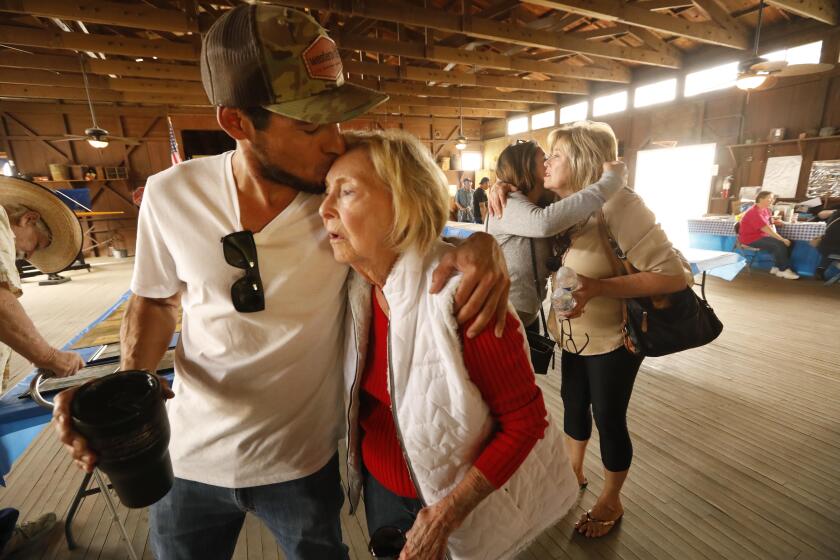James Dean made his last stop at this lonely gas station. Memories of him are fading
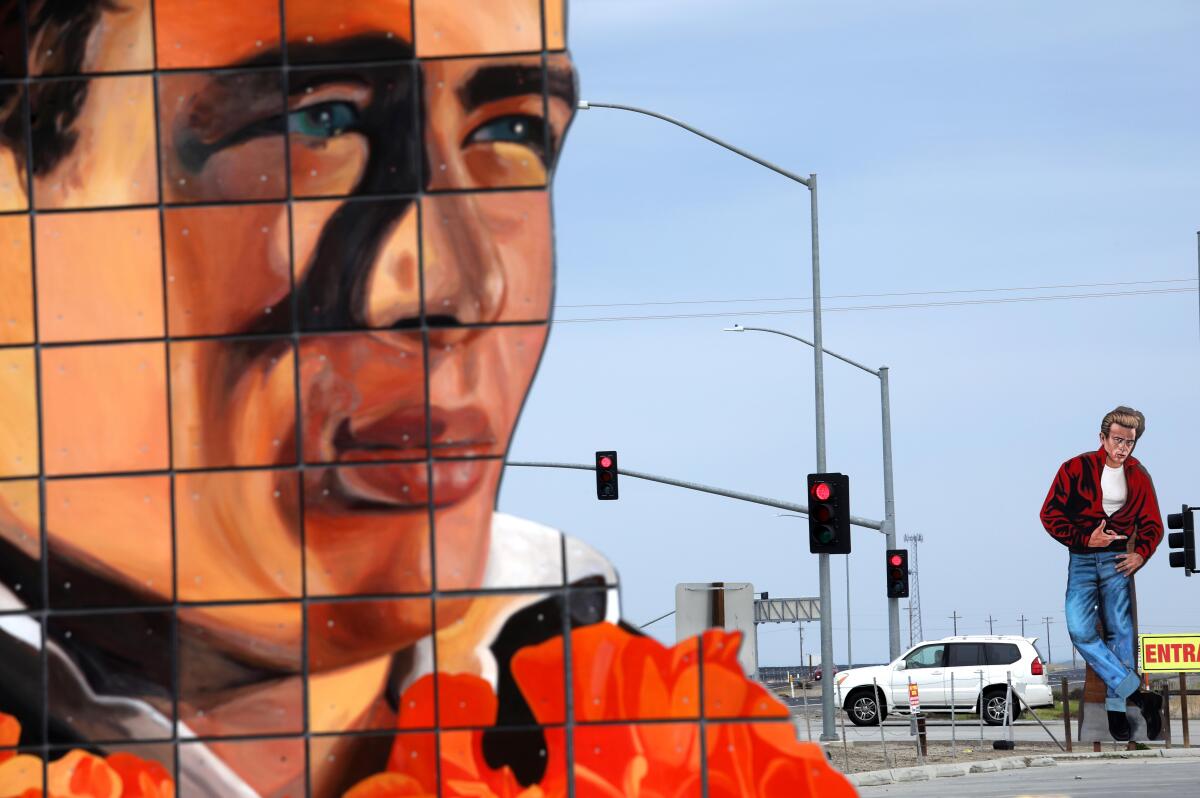
- Share via
BLACKWELL'S CORNER, Calif. — The handsome young man stares out at Highway 46: jacket collar popped, hair slicked back, blue eyes and parted lips frozen in a come-hither stare.
He points to a sign for a gas station — and the East of Eden Fudge Factory.
He’s the late actor James Dean. Or, rather, an enormous wooden cutout of him. The gas station, Blackwell’s Corner, is where the 24-year-old star of “Rebel Without a Cause” made his final stop before dying in a car crash in 1955.
It was such hallowed ground for movie buffs, even after the original building burned long ago, that fans were repeatedly caught trying to steal pieces of the old foundation.
But 68 years have passed. Memories are fading. People still ask the cashiers about Jimmy Dean — just not quite as much as they used to.
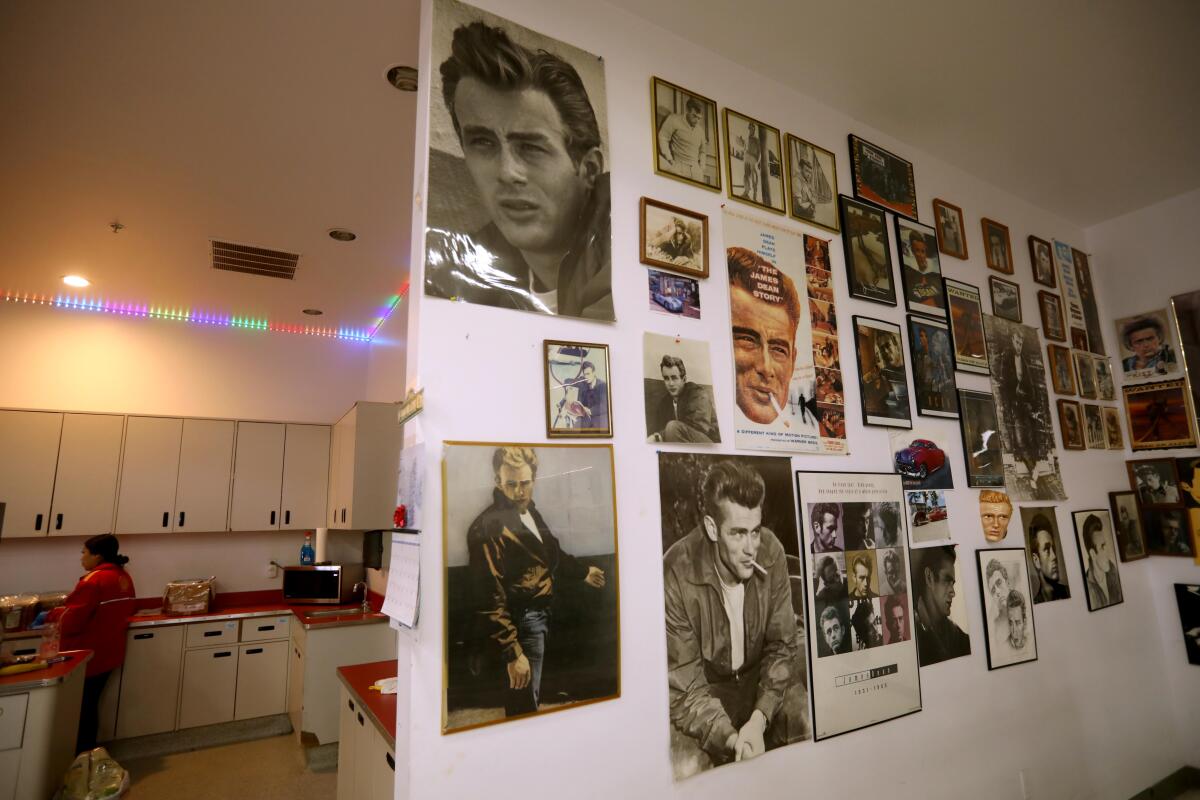
These days, signs plead for people to buy something. Anything.
“YOUR PURCHASES ARE THE ONLY REASON WE CAN STAY OPEN IN THESE TRYING TIMES,” reads the red-lettered sign by the front door.
To keep going, the 103-year-old gas station in rural Kern County is embracing something difficult: Change.
The store’s 1950s-themed Forever Young Restaurant — which closes early now because business never recovered after the COVID-19 pandemic — might be replaced with a more modern coffee shop, said owner Brock Smith.
Smith is planning to install electric vehicle chargers, hoping folks will linger and shop. A few years ago, he started using solar energy to power Blackwell’s Corner — a major transition in a place surrounded by California’s largest oil fields, with hundreds of pump jacks nodding nearby.
“We want to change it up a little bit,” said Smith, who speaks with understatement.
As for Blackwell’s Corner’s brush with Hollywood history?
“It’s kinda neat.”
The filling station stands at the treeless, windswept intersection of Highways 46 and 33, on the well-trodden path between the Central Coast and the San Joaquin Valley.
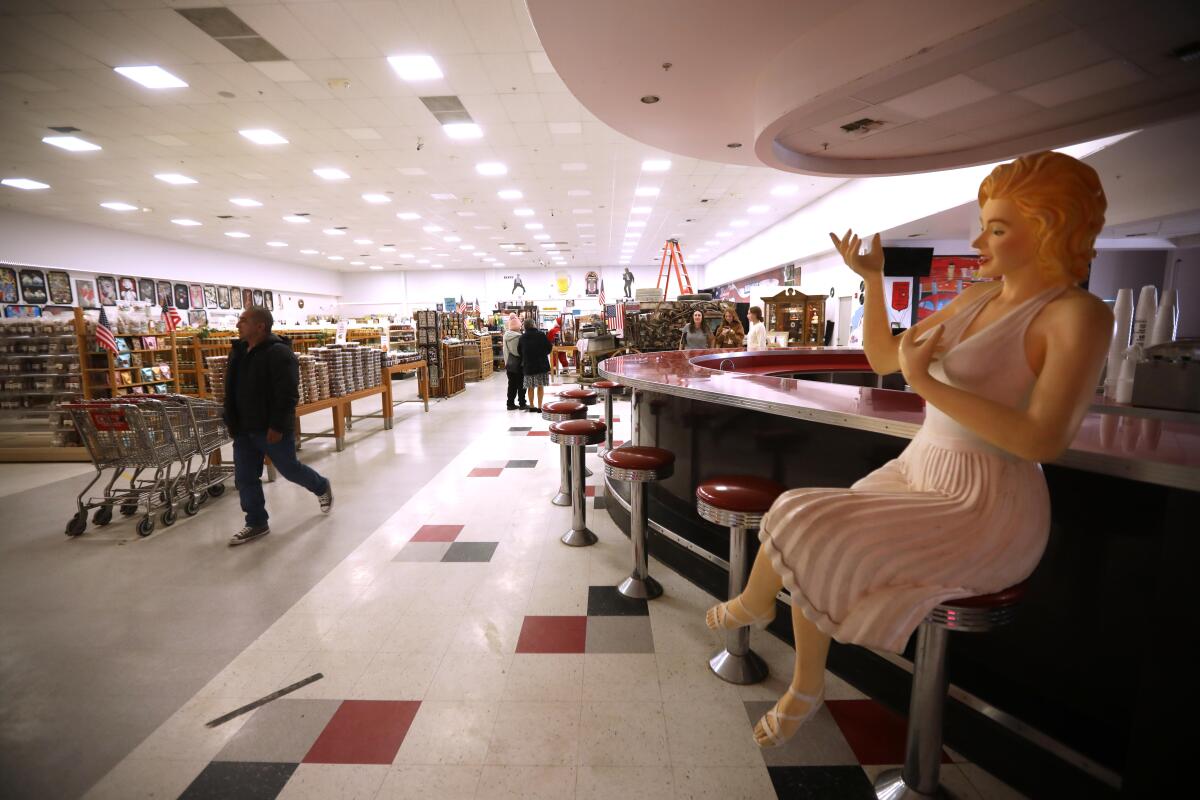
The tiny, unincorporated community near the filling station is also named Blackwell’s Corner.
A man named George Blackwell opened the station in 1921 at the crossing of what was then two dusty trails. He died in a motorcycle crash in 1924 — a year, like so many in Kern County, of catastrophic drought.
“As summer drew near, dust replaced air, dead cattle replaced sage brush, and a Model T Ford and a few 10 gallon cans replaced life at the corner,” reads a yellowed 1959 newspaper clip hanging on the wall.
James Dean, 24, one of Hollywood’s brightest new motion-picture stars, was killed early last night in a head-on collision at the rural town of Cholame, about 19 miles east of Paso Robles, the California Highway Patrol reported.
Drought turned to flood. Trails turned to highways. And along those highways came the farmers and Okies and oil rig roughnecks who would forever shape the culture and landscape of the San Joaquin Valley.
On Sept. 30, 1955, Dean — described by The Times as “one of Hollywood’s brightest new motion-picture stars” — sped through rural Kern County in a silver Porsche 550 Spyder nicknamed Little Bastard. He and his mechanic, Rolf Wutherich, riding shotgun, were headed to a race in Salinas.
After getting a speeding ticket south of Bakersfield, Dean pulled into Blackwell’s Corner, where he was said to have bought an apple and a Coca-Cola.
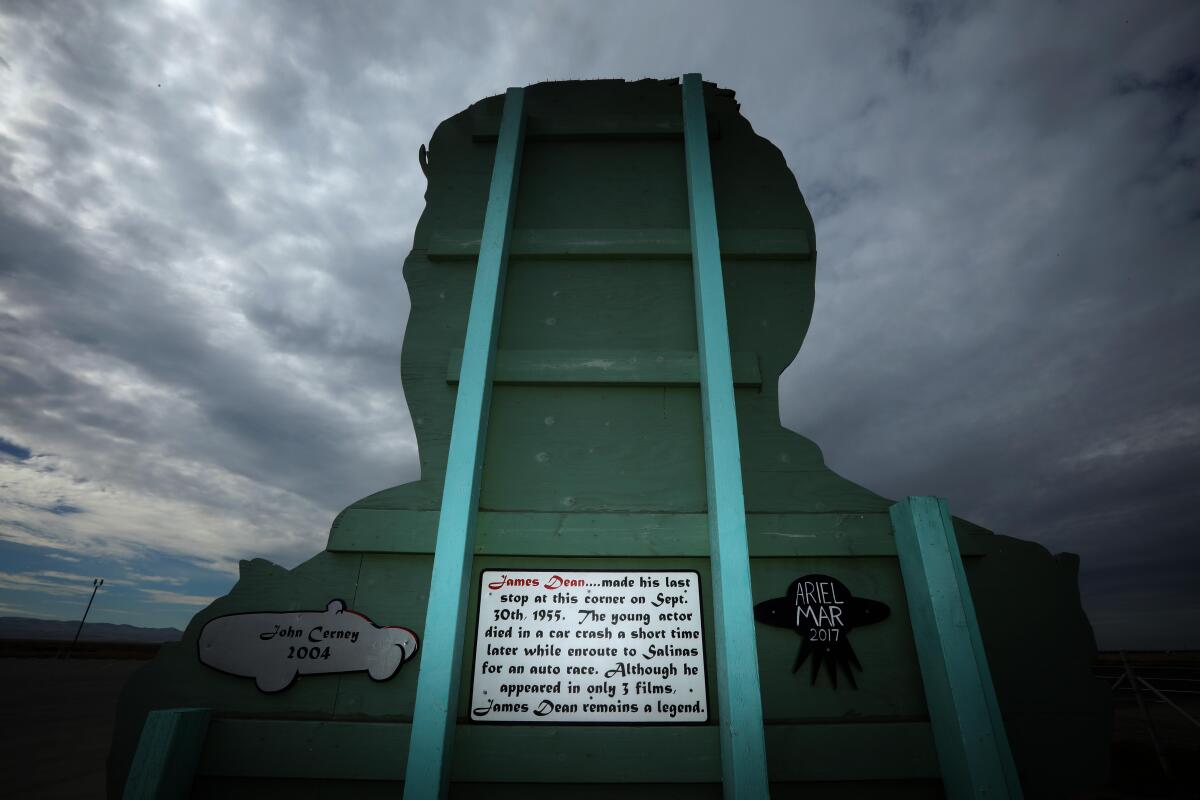
From there, he made it 26 miles west, on Highway 46, which was then U.S. Route 466. Just over the San Luis Obispo County line, the actor’s tiny sports car slammed into a Ford Tudor driven by a Cal Poly San Luis Obispo student making a left turn onto Highway 41. Dean died instantly.
Blackwell’s Corner became a shrine, of sorts.
Dean’s orange-tinted racing goggles — said to have been found by a married couple on their way to Cayucos — are displayed behind thick glass in a lighted case near the restrooms.
His face is everywhere: On paintings and posters. Jars of stuffed olives. Pistachio wheels. Bottles of local raw honey.
“The first time I came in, I was like, ‘Oh, my gosh!’ ” said Maya Woods, who was traveling last month from Santa Cruz to Palm Springs for her 23rd birthday. This part of western Kern County, she said, is “kinda sparse,” and it’s become her go-to stop.
“The whole little diner? Fudge, nuts and jam and all that? And all the random little things in here? It’s super cute and super fun and interesting and unique.”
Woods, a bartender, was traveling with her aunt, Kajsa Johnson, a teaching aide who is four months younger than her.
Johnson was excited to stop for the 1950s kitsch. She’s a huge Elvis Presley fan, thanks to her dad. But she, like Woods, has never seen any of Dean’s movies.
“I don’t even know the history!” she exclaimed when she saw Dean’s goggles and the photos hanging around them.
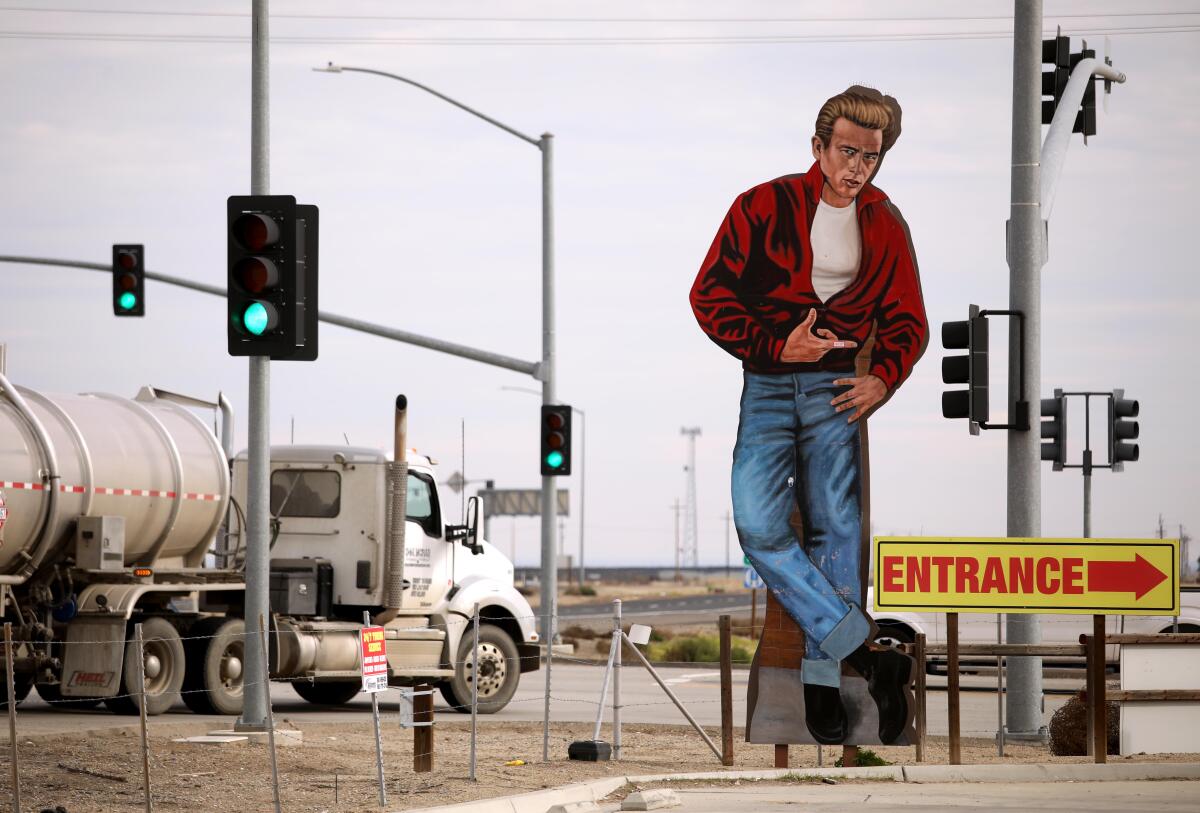
Soon after they left, a group of beefy, middle-aged motorcyclists in leather Harley-Davidson vests beelined toward the bathroom. They never paused to look at the display.
Details of Dean’s crash — once international news — have faded from the public consciousness. Some customers have told Smith they thought Dean died on Mulholland Drive in Los Angeles. Others swore he died in a plane crash.
Smith, 64, of Bakersfield, has worked at Blackwell’s Corner for two decades. He is always shocked how many young people still know who Dean is. Then again, there are a lot who have no idea.
“I always tell them: Google it. There’s a lot of history with this man.
“People are very interested. They ask, ‘Was this really his last stop?’ Of course, you get people joking around, saying that where he died was his last stop.”
The pandemic was hard on Blackwell’s Corner. Its 100-year anniversary in 2021 passed quietly, without celebration — unlike the 50th anniversary of Dean’s death in 2005, when fans dressed like the actor descended on the store and retraced his final drive.
Change, and quiet, also have come to Cholame, the little town where Dean died.
The Jack Ranch Cafe, a restaurant near the fatal intersection that was filled with Dean-themed tchotchkes, shut down in 2022 after it, too, struggled during the pandemic.
In its empty parking lot, the facade of a memorial — a metal sculpture wrapped around a tree — is damaged. An adjacent plaque is covered in bird poop.
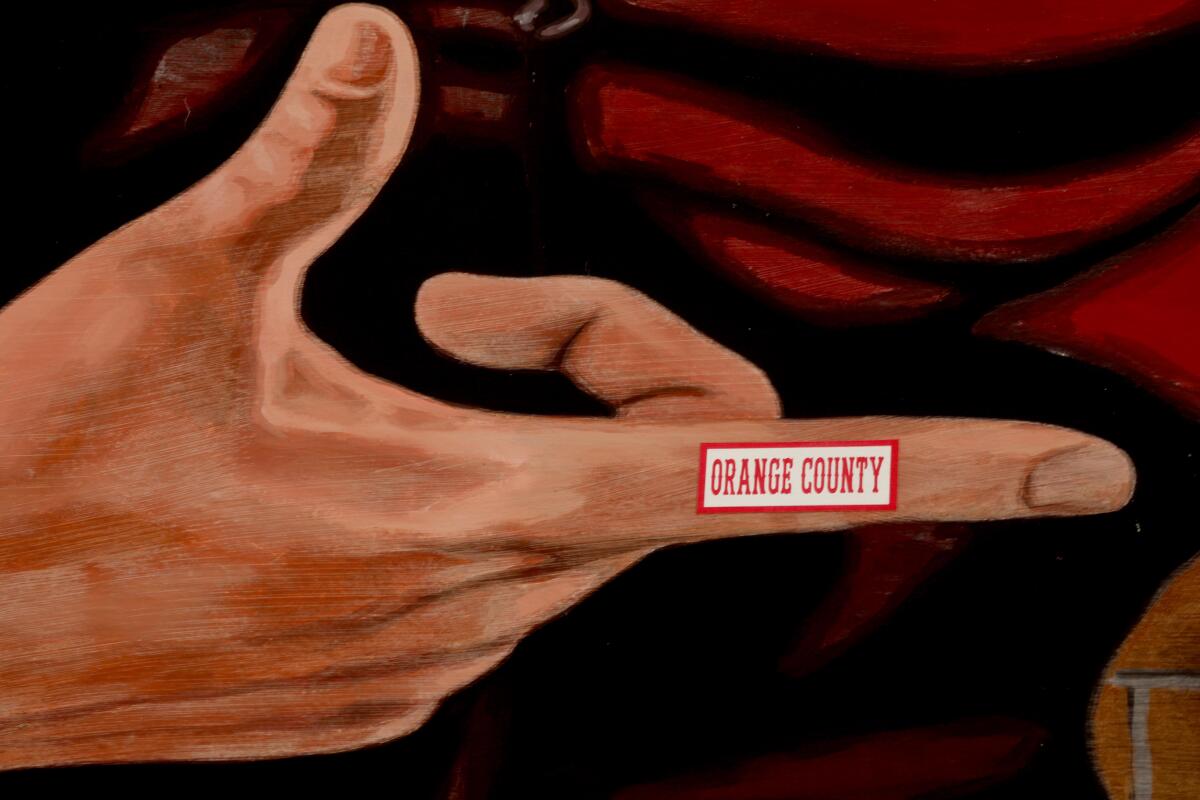
Even the route where Dean died, a stretch of Highway 46 known as “Blood Alley” because of its many crashes, is changing.
Since 2008, the California Department of Transportation has been widening the pass between Paso Robles and Lost Hills from a two-lane highway to a four-lane divided expressway.
The deadly “Y” interchange with Highway 41, which requires eastbound drivers turning north to cut across traffic, as happened in Dean’s crash, will be reconfigured with an elevated onramp, said Jim Shivers, a Caltrans spokesman.
“That Y will not be there,” Shivers said of the intersection, now called the James Dean Memorial Junction. “That site will be abandoned.”
At lunchtime on a recent Wednesday afternoon, the Forever Young Restaurant inside Blackwell’s Corner, with its red vinyl booths, jukebox and paintings of Dean and Elvis and Marilyn Monroe, was empty.
But the nearby aisles were filled with loud laughter from a group of theater actresses on a road trip between Los Angeles and Carmel-by-the-Sea.
They were delighted — and surprised — to have stumbled upon Dean’s last stop.
“It was literally as I was walking out of the bathroom, and I went, ‘James Dean?’ ” said Laila Ayad of Silver Lake, who stopped to admire the goggles outside the restroom before buying a tuna sandwich.
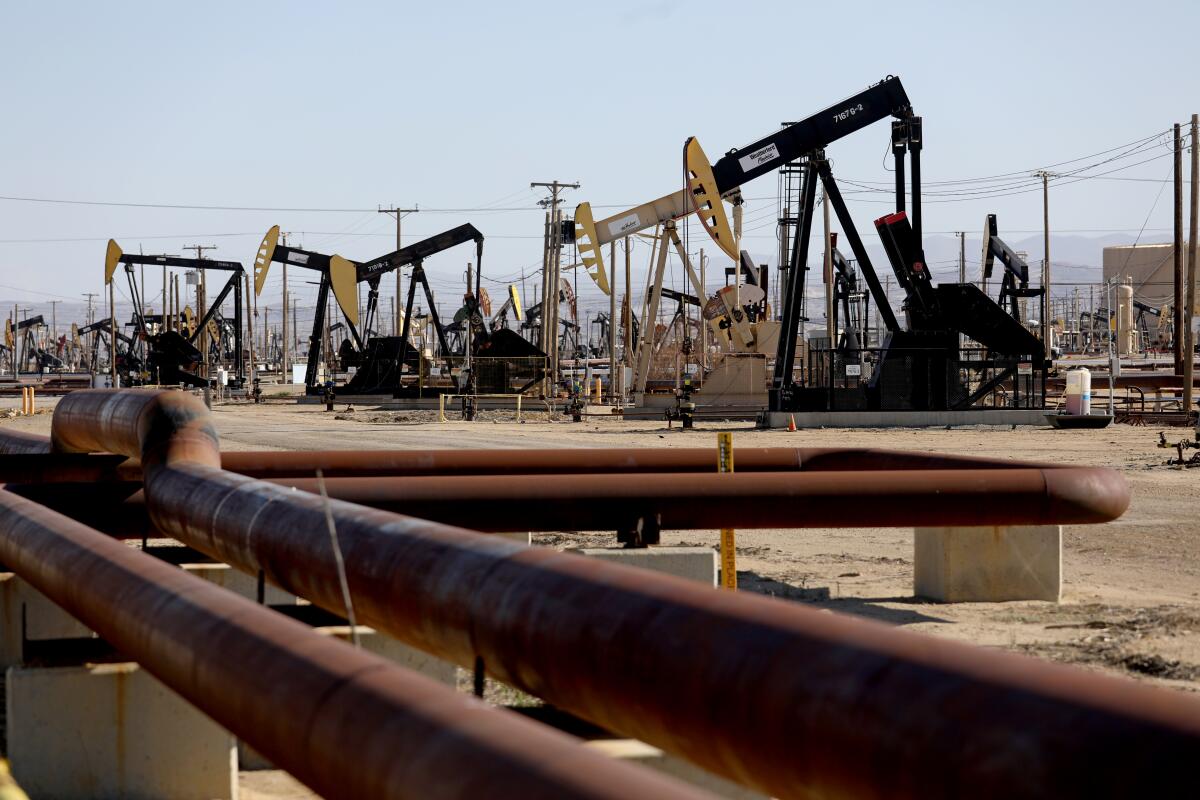
Sarah Utterback, from Toluca Lake, said she was inspired, after reading the news articles on the walls, to revisit Dean’s movies.
“He inspired a lot of modern-day actors that we all love in his very short, young life,” she said.
The history on display here “is quite morbid and sad,” she said. But it’s also “so quintessentially California.”
The women posed for photos next to a 1930 Ford Model A with a 1935 Maytag washing machine mounted on the rear bumper. It was a replica of the jalopies that passed through Kern County during the Dust Bowl.
The Dust Bowl Festival at the historic Weedpatch Camp, immortalized by John Steinbeck’s “The Grapes of Wrath,” ended this year after three decades. The Okie generation is fading in California, but migrant stories will never end.
Jack Loucks, a retired mechanic, cobbled together the car and two others. He used to take them to the annual Dust Bowl Festival southeast of Bakersfield, but that faded away after the organizers — many of them Okies and Arkies — grew too old.
Loucks, 83, of Bakersfield, used to take the cars to schools all the time. But, he said, educators don’t seem as interested in local Dust Bowl history as they once were.
“History is gonna repeat itself if you don’t start studying this stuff,” he said with a sigh.
He has kept the Model A parked inside the filling station for about 15 years. He was in high school when Dean crashed his Porsche.
Back when everyone was still talking about it.
More to Read
Sign up for Essential California
The most important California stories and recommendations in your inbox every morning.
You may occasionally receive promotional content from the Los Angeles Times.
